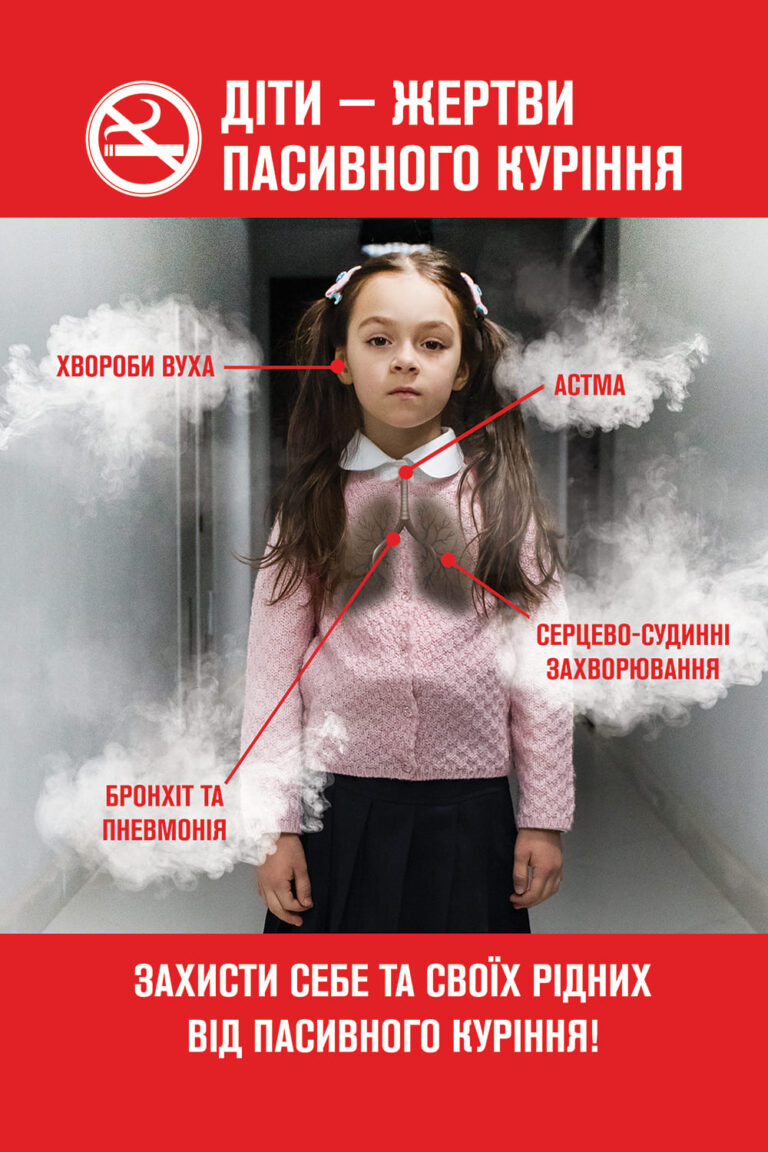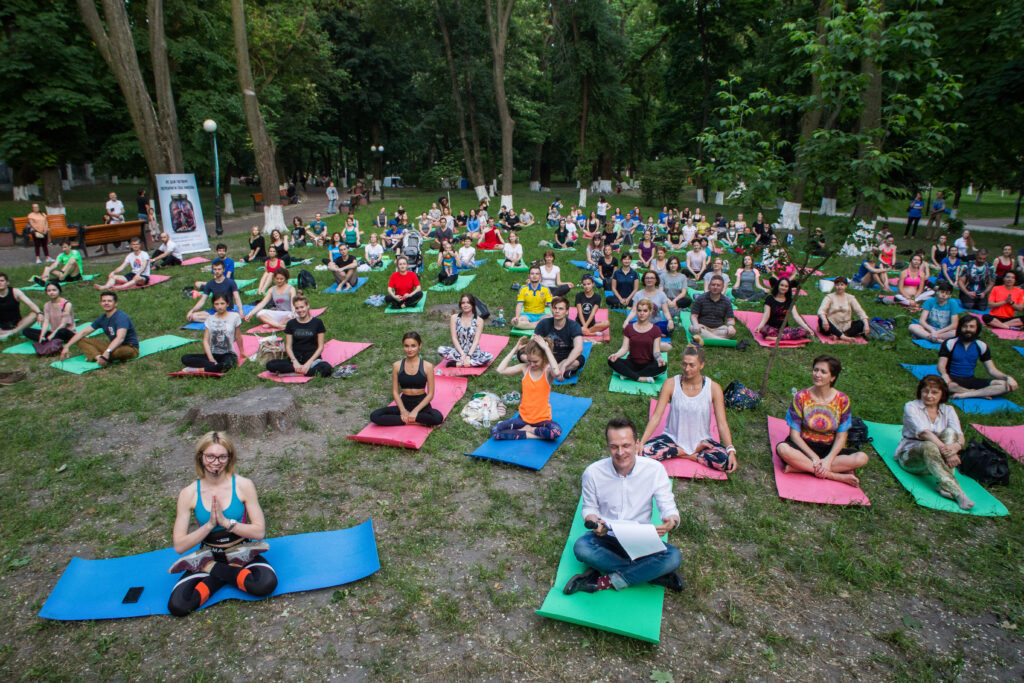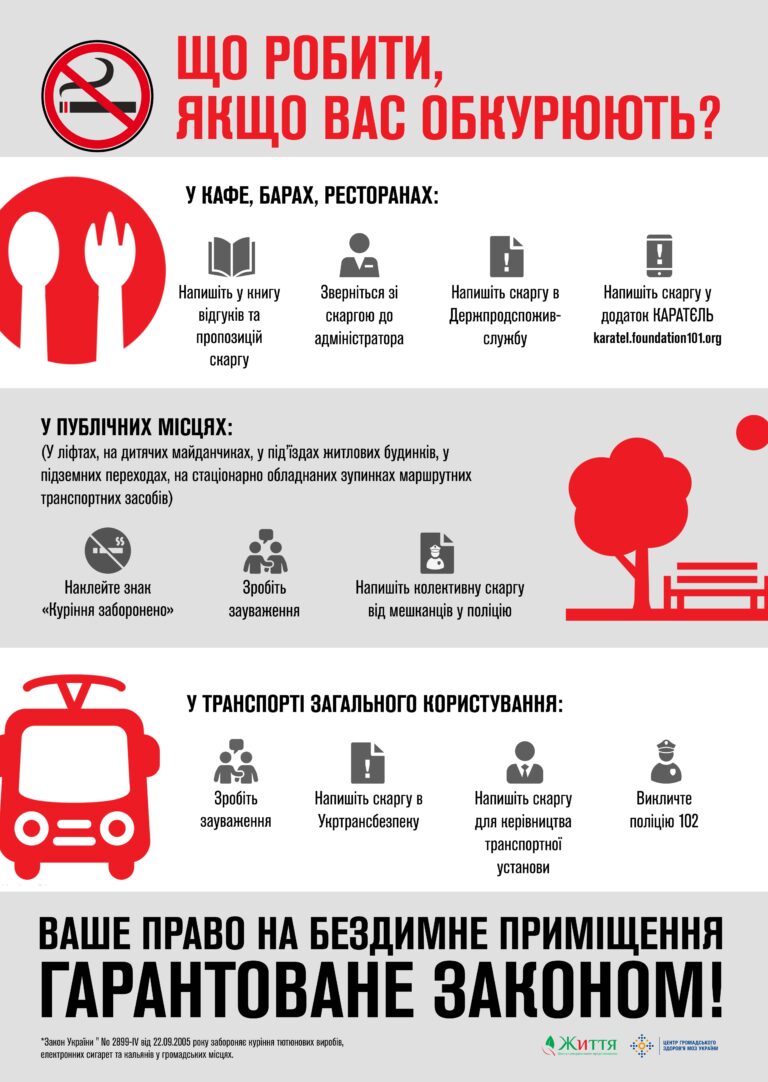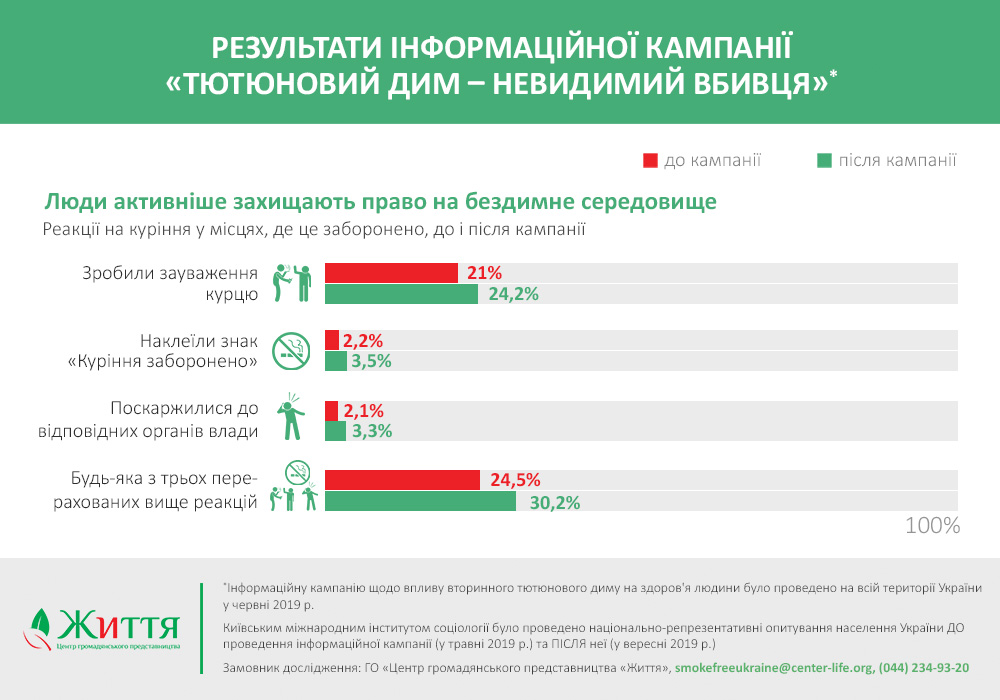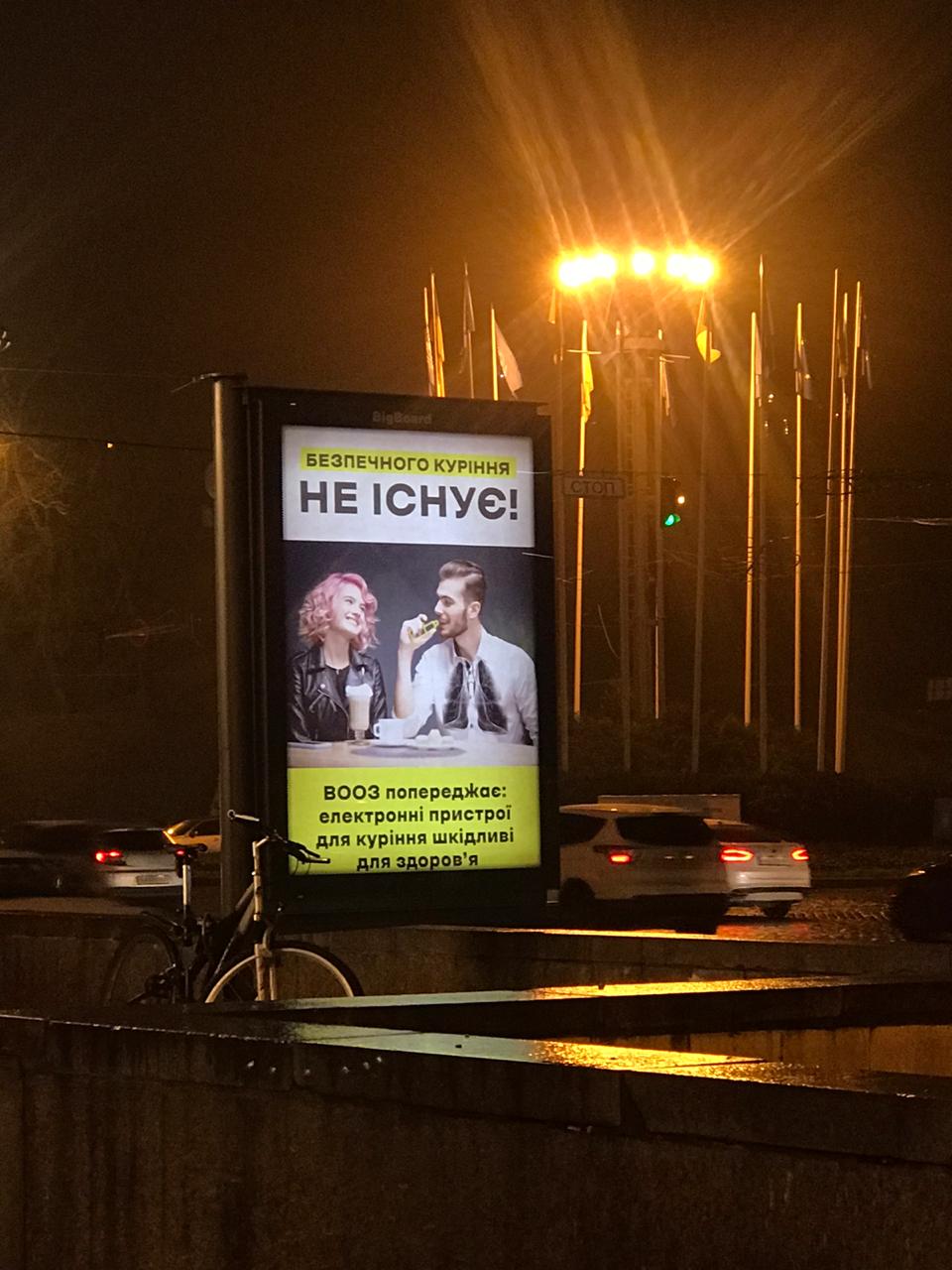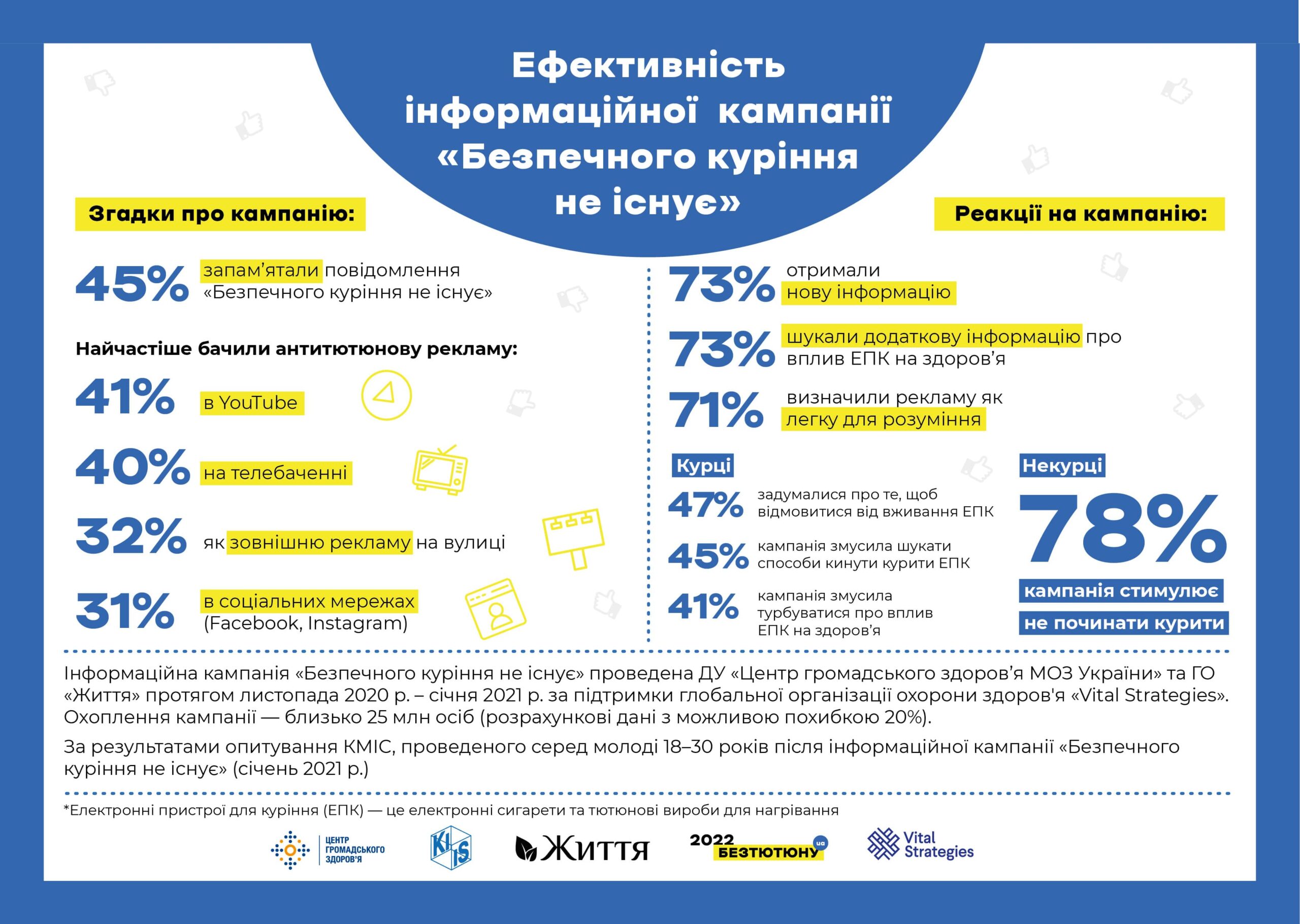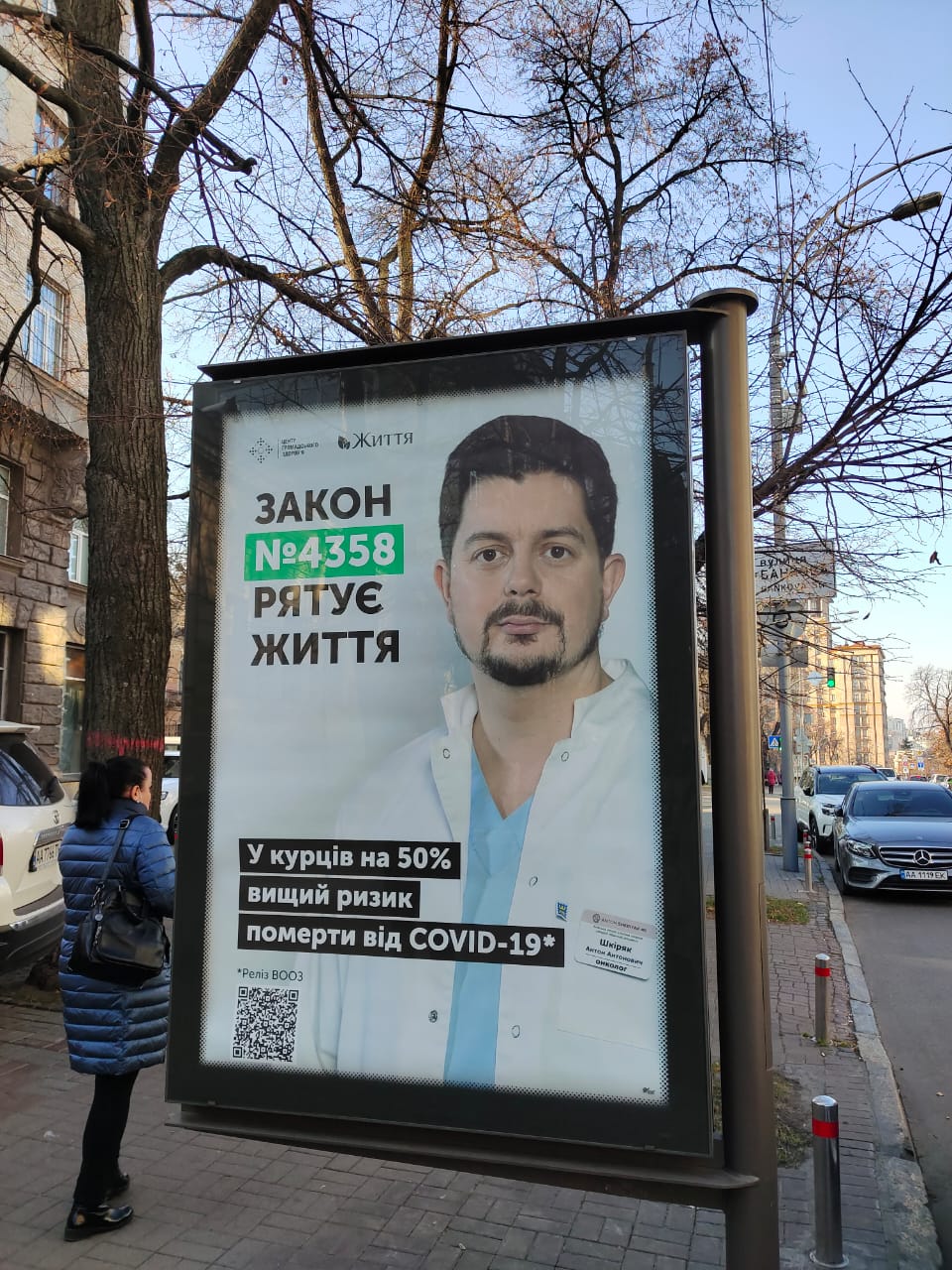Informed means protected, or what's (not) right with anti-tobacco social advertising?

What is the problem?
Every year, 8 out of 10 Ukrainians die prematurely from cardiovascular disease, cancer, diabetes, chronic respiratory diseases, and other non-communicable diseases. The major causes of this mortality are smoking, alcohol consumption, an unhealthy diet, and lack of physical activity. Many of us find it difficult to imagine a direct link between an overdose of alcohol or a cigarette smoked and premature death. But 85,000 of our citizens die each year from smoking-related diseases alone.
What is the solution?
Anti-tobacco campaigns are a way to reduce deaths from non-communicable diseases.
For a long time in Ukraine, little attention was paid to informational anti-tobacco campaigns. And this is one of the best ways to influence the knowledge, attitude, and behavior of Ukrainians regarding tobacco use, in particular, the most cost-effective way (more than 100 independent international studies confirm these facts). However, in 2018-2020 our country has achieved the best results in conducting such campaigns according to the WHO Report on the Global Tobacco Epidemic, published in 2021. But why is this not a victory and what should the government do to reduce the number of Ukrainians dying from smoking?
How does it work in Ukraine?
Despite the legal ban on tobacco advertising, multinational corporations are finding ways to attract new smokers and, in particular, young people and minors to their products. According to surveys, 6 out of 10 young Ukrainians aged 14-34 indicate that they see tobacco advertising.
To promote its products, the tobacco industry uses various marketing tricks: the bright display of cigarettes, covert advertising of tobacco products, activities under the guise of corporate social responsibility, advertising of electronic smoking devices, which are positioned as less harmful. Thus, smoking, which causes drug addiction and is the cause of premature death, isn't a conscious choice of Ukrainians.
To overcome this problem, in 2018 the Government of Ukraine approved the National Action Plan on Noncommunicable Diseases. One of the goals of the plan is to reduce the prevalence of smoking among the population by conducting information campaigns about the negative effects of nicotine and tobacco use. Ukraine also must conduct anti-tobacco information campaigns per the WHO Framework Convention on Tobacco Control, which the state ratified in 2006.
Anti-tobacco information campaigns aren't a formality. Their quality and complexity determine the extent to which Ukrainians, and in particular young people, will be informed about marketing strategies and the harmfulness of tobacco products. The level of this awareness directly affects the decision (not) to start using tobacco and nicotine products.
Does it really work?
How were Ukrainians informed in previous years and did it work?
In Ukraine, anti-tobacco information campaigns are carried out mainly by NGOs with the financial and expert support of international organizations. Undoubtedly, the most influential are nationwide campaigns, which can reach more citizens than targeted activities in individual regions.
Over the past four years, such campaigns in Ukraine have been conducted mainly by the Life Center for Civic Representation, a non-governmental organization that has been working in the field of tobacco control for more than 12 years (and in recent years on public health). The information campaigns were facilitated by the Center for Public Health of the Ministry of Health of Ukraine (CPH) and regional centers.
During the communication campaigns on national and regional TV channels, videos with campaign messages were broadcast in subway trains, on the screens of stations, and public transport stops. Posters about the dangers of smoking could be seen on billboards and city lights in Kyiv and the regions, and flyers, posters, and stickers were distributed in medical and educational institutions, libraries, and local governments. During one of the campaigns, a mass media event in the yoga format, "Breathe freely in a world without tobacco," took place in 10 Ukrainian cities.
So what were Ukrainians informed about?
- "Tobacco smoke is an invisible killer." Research shows that more than half of young Ukrainians are exposed to tobacco smoke in closed public places. With this in mind, in 2018-2019 an information campaign was conducted to raise awareness of the dangers of secondhand smoke and the willingness of citizens to actively defend their right to smoke, as well as support the implementation of legislation banning smoking in public places.
Did the campaign achieve its goal? According to the KIIS survey, after the campaign, the number of Ukrainians who became more active in demanding a ban on smoking in places designated by law increased by almost 25% (from 24% to 30%). In addition, the percentage of smokers who received complaints about smoking in restricted places increased. Smokers began to feel more pressured for smoking in porches, cafes, bars, restaurants, and public transportation stops.
- "Safe smoking doesn't exist." According to 2019-2020, due to the tobacco industry's aggressive marketing, the percentage of adult smokers of electronic smoking devices is increasing. Among teenagers aged 13-15, one in five children uses e-cigarettes (as of 2017). Therefore, it is important to inform young people about the health risks of electronic smoking devices. Such an advertising campaign was conducted in 2020-2021. The key messages of the campaign were primarily aimed at young people aged 18-25, parents, and Ukrainians who haven't started smoking. This target audience was chosen to prevent the onset of smoking among young people and other non-smokers.
The advertising campaign had a positive impact on Ukrainians who saw it. In particular, 8 out of 10 non-smokers who saw the advertisement thought that it encouraged them not to start smoking. Almost half of the smokers who remembered the advertisement thought about giving up the use of electronic smoking devices and said that the advertisement encouraged them to seek additional information about the health effects of these devices.
- "Quit smoking now." During the COVID-19 pandemic, the importance of quitting smoking became even more important, as according to the WHO data, smokers have a 50% higher risk of complications and death from COVID-19. In this regard, in 2021, the WHO announced an annual information campaign to help smokers who want to get rid of smoking.
In Ukraine, the "Quit Smoking Now" campaign was developed using WHO materials. There were reports on social media, television, and other channels that smokers were at greater risk of serious illness or death from COVID-19, and links to useful resources for quitting smoking. And doctors and the medical community have received information about the need to encourage smoking patients to quit now. The Department of Public Communications of the Kyiv City State Administration recognized the "Quit Smoking Now" information campaign as one of the winners of the TOP-100 competition of successful interaction practices between government and community in addressing local issues in 2021.
Even more useful solutions
Tobacco control information campaigns are an effective tool to reduce deaths from non-communicable diseases. Why not hold them more often and more?
The fact is that there are several serious challenges in the realities of our state.
First, although the authorities have a responsibility to inform the public about the dangers of tobacco, in practice there is no single coordination mechanism at the state level to involve all parties in the development and conduct of such campaigns. In the last few years, this function has been partially performed by public organizations. However, it is the state that must ensure that information campaigns are conducted systematically and in a coordinated manner, as such campaigns are comprehensive.
Secondly, the current legislation regulates this area in a framework. In particular, there is no clear algorithm for allocating funding from the state budget for the development and dissemination of anti-tobacco social advertising, there are no detailed ways to distribute it. The methods of informing the population about the harm of tobacco are partially defined in the National Action Plan on Noncommunicable Diseases. However, funding for tobacco control measures hasn't been allocated, so this plan is declarative in this regard.
Third, although Ukrainian law allows social advertising to be placed in the communal media free of charge, in practice this mechanism is opaque. Airtime is expensive, so the media often refuse to place free social advertising, or place it at night (in the case of television).
To significantly influence public opinion on tobacco use and reduce mortality from non-communicable diseases, the Ukrainian media must constantly be aware of the dangers of tobacco use and expose new marketing tricks of the tobacco industry. Experts believe that it is necessary to conduct national anti-tobacco campaigns with state support at least twice a year and strengthen anti-tobacco legislation.
Currently, Ukraine is fulfilling its international and national obligations to inform the public about the dangers of tobacco use by NGOs at the expense of international donors. However, the state should take the initiative in this matter to ensure more comprehensive and effective information. After all, it is about the life and health of Ukrainians.
The first steps in this direction should be to provide funding from the State Budget for anti-tobacco campaigns and to establish coordination of all parties for the annual information campaigns.



